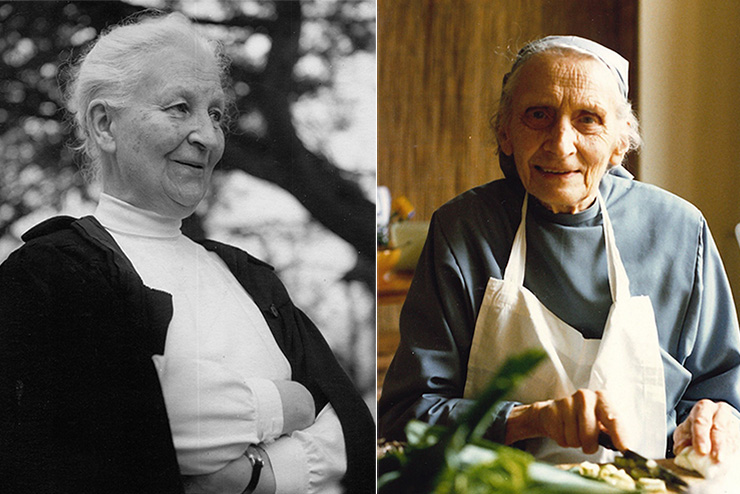
Geneviève Micheli (1883–1961) and Marguerite de Beaumont (1895–1986)
Founders of the Grandchamp Community, walkers along the path of communion

“I think that when Christ walked the earth, encountering him had all the greatness and the power of a silence permeated by God. And it remains the same today. He freed humankind from its torpor, its false riches, a dispersal that is also a form of death, and he affirmed the power of God.”
Geneviève Micheli, 1938
Geneviève Micheli was born in France to a noble Catholic family on her father’s side and a Protestant family from Alsace on her mother’s side. She moved to Geneva to marry in 1902 and had three children. After the early accidental death of her husband in 1910, she turned intensely toward religion and co-founded Dames de Morges (Ladies of Morges) in 1913, a community of married Protestant women who gathered for spiritual exercises. She would go on to meet Marguerite de Beaumont in 1928. Micheli conducted the first spiritual retreat at Grandchamp from 1931, which was organized by Marguerite de Beaumont. From 1930 to 1940, Micheli studied in Paris, where she made contacts within ecumenical circles. Finally, upon Beaumont’s request, she returned to Grandchamp and became the community superior in 1944, now known as Mère Geneviève. The sisters there have been affected by the painful experience of the divides among Christians. From the very beginning, Jesus’ prayer for the unity of his people was a particular concern of theirs. They also received inspiration for their development from the Catholic abbot Paul Couturier.
Marguerite de Beaumont grew up among Geneva’s upper class. She remained unmarried throughout her life and trained as a nurse, as she was touched by the suffering of the poor and by social injustice. In 1928, she spent time in Assisi with Geneviève Micheli, co-founder and later superior of Grandchamp. The two women remained close throughout their lives. In the early 1930s, they rediscovered the importance of silence in their life of faith together with other women from the Reformed Church in French-speaking Switzerland. Beaumont prepared spiritual retreats, which initially took place once a year in Grandchamp, a small hamlet overlooking Lake Neuchâtel. After withdrawing to Grandchamp for the first time in 1931, Beaumont settled there on a permanent basis with another sister from 1936 in order to keep the house open for prayers and retreats all year round. Community life would soon begin to properly take shape once the next woman joined in 1940. It combined contemplative life and spiritual service, and they sought to find a monastic form for the community. For the first sisters, meditation on the biblical word and attention to the traditions of the church were fundamental to their search for a life together guided by the Spirit of God. In 1940 Roger Schutz, later Brother Roger, visited the community and was inspired by conversations with Beaumont to found the ecumenical Taizé Community. After the war, young women from Germany, France, and the Netherlands would go on to join the Grandchamp sisters.
In 1952 Beaumont took the order vows as one of the first seven sisters and decided to commit for life. Led by Superior Geneviève Micheli, the Grandchamp community decided to live as a community of sisters of different Protestant traditions, following an early version of the rules of the Taizé community. Beaumont lived at times in other communities associated with Grandchamp, in Lebanon in 1957, in Israel in 1957 and 1962, and at Taizé from 1963 to 1985.
Despite their differing personalities, Sister Marguerite and Mother Geneviève were closely united in their faith and calling. Through each of them, Christ revealed himself to the other.
The community now numbers around fifty sisters from different churches, countries, and cultures. Most live in Grandchamp, some at Sonnenhof in Basel-Land, and others elsewhere in Switzerland, the Netherlands, and France.



